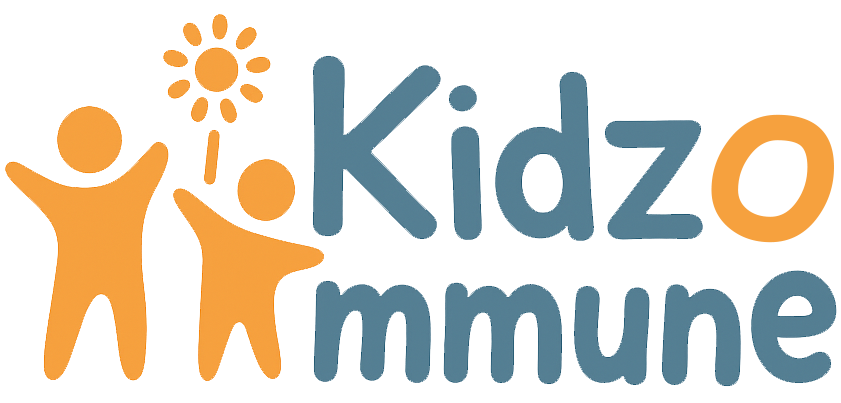- Written by: admin
- September 6, 2025
What Is Immunity?
Immunity is our body’s defense system which protects us from various illnesses and infections from harmful germs, bacteria & viruses.
Types of immunity:
- Innate Immunity
- Acquired (Adaptive) Immunity
Innate immunity
This type of immunity is since birth that we are born with. Innate immunity is not fully developed and dependent initially on antibodies passed from the mother during pregnancy and breastfeeding.
This is the first line of defense, providing a rapid response to invaders like bacteria or viruses. It includes physical barriers like skin and mucous membranes, as well as specialized cells that surround and destroy pathogens.
Acquired (Adaptive) immunity
This type of immunity develops as children are exposed to different germs over the time. As children encounter various germs through play, food, and other interactions, their immune system learns to recognize and fight them off.
Why Kids Need Strong Immunity
- Healthy growth: A healthy immune system is crucial for children’s healthy development, allowing them to grow and learn without constant illness. Protection During a Critical Developmental Stage
- Prevents infection: A strong immune system is vital for preventing and fighting off infections, keeping us healthy and well. reduce the risk of allergies, asthma & autoimmune diseases etc.
- Speeds Healing recovery: Immune memory lets the body combat re infection more effectively. The immune system plays a key role in repairing damaged tissues and promoting recovery from illness or injury.
- Fights cancer: Immune cells can detect and destroy abnormal cells before tumors form
- Controls autoimmune responses: A balanced immune system prevents mistaken attacks on healthy cells
- Essential for vaccines: Adaptive immunity underpins vaccine effectiveness by teaching the body without causing illness
- Overall health: A healthy immune system contributes to overall well-being and helps maintain a balanced internal environment.
- Less sickness means more consistent school attendance: boosting learning, social skills, and overall development
- Immune cells influence brain development: which can positively impact cognitive and neuro developmental outcomes
- Some viral infections like measles can cause “immune amnesia,”: wiping out immune memory so strong immunity is required to prevent from such infections.
- Laying Foundations for Long-Term Health
- Setting up strong immunity in childhood: establishes lifelong resilience and healthier future.
Strengthening immunity isn’t about chasing perfect health—it’s about giving your body the tools to:
- Defend itself effectively
- Heal quickly
- Promotes growth
- Maintain high energy and wellbeing
- Regulate inflammation
- Support community health
Complications of Recurrent Infections in Children:
Physical Health:
- Growth Delays: Frequent infections can interfere with a child’s ability to grow and develop properly.
- Malnutrition: Recurrent infections can affect appetite and nutrient absorption, potentially leading to malnutrition.
- Organ Damage: In severe cases, repeated infections can cause damage to vital organs, particularly if the infections are severe or involve specific organs.
Mental and Emotional Health:
- Lack of confidence: children with frequent infections may develop lack of confidence.
- Anxiety and Depression: Living with recurrent infections can be stressful for children, potentially leading to anxiety, depression, and social isolation.
- Social Isolation: Children with frequent infections may miss school and social activities, leading to social isolation and difficulty forming relationships.
Educational Impact:
- Absenteeism: Frequent infections can lead to missed school days, which can disrupt a child’s education and potentially lead to learning difficulties.
- Developmental Delays: In some cases, chronic infections can contribute to developmental delays, especially if they impact nutrition or cognitive function.
Other:
- Immunodeficiency: Recurrent infections, especially those that are severe, atypical, or involve certain types of pathogens, can be a sign of an underlying primary or secondary immunodeficiency.
- Increased Risk of Asthma: Recurrent respiratory infections, particularly those involving wheezing in young children, can be a risk factor for developing asthma later in life.
When to be concerned:
- Frequent infections: More than 4-6 ear infections per year, more than 2 sinus infections or pneumonia per year, or multiple serious infections (e.g., septicemia, meningitis).
- Infections with unusual organisms: Infections caused by fungi, viruses, or intracellular bacteria.
- Infections that don’t respond to treatment: Infections that don’t clear up with standard treatment or require prolonged antibiotic use.
- Failure to thrive: If a child is not growing and gaining weight as expected.
- Other symptoms: Unexplained bruising, fatigue, or other unusual symptoms.
Specific
- Breathing Problems: Enlarged tonsils and adenoids can narrow the airway, causing snoring, mouth breathing, and in severe cases, obstructive sleep apnea (pauses in breathing during sleep).
- Sleep Disturbances: Sleep disturbances can lead to restless sleep, daytime sleepiness, and even behavioral problems.
- Ear and Sinus Infections: Enlarged adenoids can block the Eustachian tube, which connects the middle ear to the throat, increasing the risk of ear infections and fluid buildup in the ear. They can also contribute to sinus infections.
- Speech and Eating Difficulties: Enlarged tonsils can make swallowing and speaking difficult, potentially leading to a stuffy-sounding voice.









